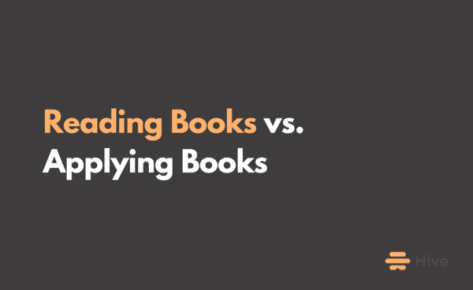We’ve all been there. You’re sitting with a pile of books and unsure where to start. Do you read them cover to cover? Or do you select the most important bits relevant to your life and then apply them?
If you choose the latter option, does this mean that reading every chapter is unimportant as long as we can apply the key ideas?
Do we need to understand everything thoroughly before we go out and apply it? Or should we just trust our instincts and focus on applying what seems useful without worrying about the rest?
Reading books is a skill. It’s not only a great way to learn new things but also a fantastic way to expand your mind, develop personal connections with others, and grow as a person. Even with the availability of apps to read books for free, the real value lies not just in the accessibility of knowledge, but in our ability to apply it.
“I am a part of everything that I have read,” says Theodore Roosevelt.
Reading great books is an excellent way to gain knowledge and experience. There is no denying that spending time with books can broaden your horizons and expose you to new ideas, philosophies, cultures, and ways of thinking.
Reading books is also useful because it helps us to understand how others think, what they have learned, and how they tackle different problems.
There are plenty of reasons why people read. Some read simply for pleasure, while others delve into the pages of a book to learn new things, gain insight on a particular subject, or improve their overall knowledge on a topic.
The more you read, the more you increase your knowledge and understanding of different subjects or topics. In other words, reading gives you something in return. However, reading alone does not make you smart; it’s what you do with what you read that matters most.
Life-changing knowledge is useless until you apply it
“Knowledge trapped in books neatly stacked is meaningless and powerless until applied for betterment of life.” — Ratna Kusnur
Dale Carnegie was right when he said, “Knowledge isn’t power until it’s applied.” Applying the knowledge or skills that you have gained from reading books is just as important as reading them in the first place. Reading books alone is not enough if you aim to improve yourself, gain experience or change your career.
But applying what you learn in books is an entirely different skill. You can read a book and even understand the author’s key ideas and message. You can enjoy the book. But reading a book to improve your life? That’s another ball game.
Anyone who has ever put book knowledge into practice can attest that knowing how something works and executing that knowledge are two very different things.
Most people are good at gathering knowledge but fall short of application to gain wisdom and experience. For most people, it’s hard to read and apply book knowledge simultaneously because learning works both ways for different reasons.
Applying a book’s advice means actively putting its principles, ideas, advice and lessons into practice. While reading books is an engaging pastime and a valuable educational exercise, applying the principles in a book is what makes you wiser and more knowledgeable about life.
Learning requires practice and application. In fact, the ability to learn and apply what you know is a skill in itself — a transferable skill.
It’s not just something you can do when you’re reading a book or listening to someone speak; it’s something you can do with any type of content, anywhere, at any time.
Learning something new is challenging for almost everyone. However, you can improve your abilities quickly and easily by putting your learning into practice and practising what you know.
Whether it be nonfiction or fiction books, applying what you learn in books is a skill that will take your intellectual abilities and experience to the next level.
When learning any new skill or topic, it’s important to find ways to apply those learnings, so they stick with you and become second nature over time.
To make knowledge application a habit, start small
“In the case of good books, the point is not to see how many of them you can get through, but rather how many can get through to you.” — Mortimer J. Adler
Reading books can also be quite beneficial to your personal growth and development. If you read with a purpose, it’ll be much more than just another passing time activity.
“All I have learned, I learned from books,” Abraham Lincoln said.
When you are ready to apply specific knowledge to your life, put it on your calendar. Applying what you read in books takes commitment, dedication and effort beyond simply turning their pages.
Apply specific ideas one at a time. If you rush the process, you may get overwhelmed and give up. If you take notes when you read, separate general knowledge from lessons and advice you intend to apply in your life.
Schedule when you want to start practicing what you are learning and commit to one action at a time — blocks of time for knowledge application.
Books give us insight into other people’s experiences and allow us to see things from someone else’s point of view. Reading allows us to grow as people, understand others better, and expand our minds in ways we could never have imagined before reading those books. But without practice and application, new knowledge will not change your life.
This article originally appeared in Medium.
